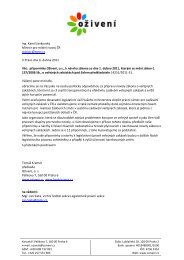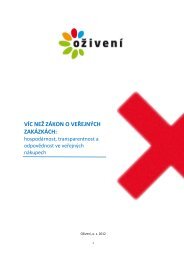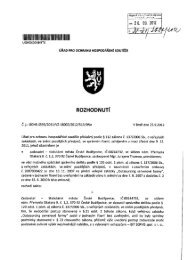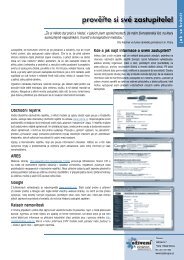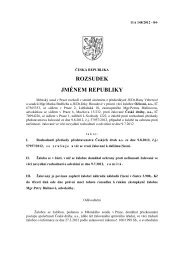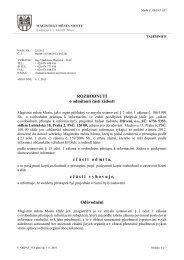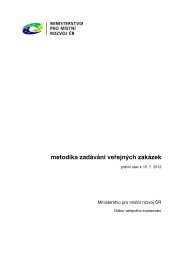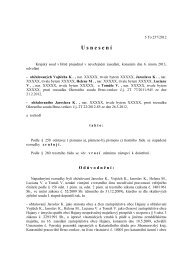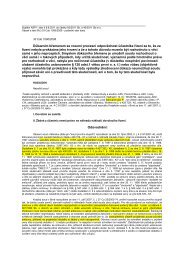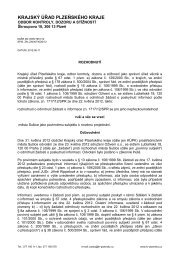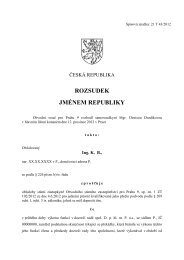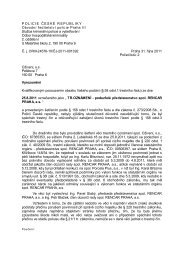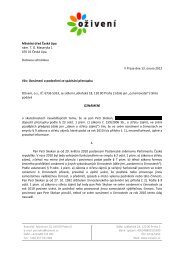Managing Conflict of Interest - Organisation for Economic Co ...
Managing Conflict of Interest - Organisation for Economic Co ...
Managing Conflict of Interest - Organisation for Economic Co ...
Create successful ePaper yourself
Turn your PDF publications into a flip-book with our unique Google optimized e-Paper software.
60 <strong>Managing</strong> <strong><strong>Co</strong>nflict</strong> <strong>of</strong> <strong>Interest</strong>words, corruption occurs in conflict-<strong>of</strong>-interest situations, i.e., situationsinvolving conflicts between one’s duties as a public <strong>of</strong>ficial andprivate interests as a private person. There<strong>for</strong>e, to prevent corruption,anti-corruption policies and the tools to carry out these policiesmust help public <strong>of</strong>ficials to per<strong>for</strong>m their duties without compromisingpublic interests in conflict-<strong>of</strong>-interest situations.Summary <strong>of</strong> the Republic <strong>of</strong> Korea’s Tools <strong>for</strong> Preventing <strong><strong>Co</strong>nflict</strong><strong>of</strong> <strong>Interest</strong>The Republic <strong>of</strong> Korea has developed several tools to addressconflict <strong>of</strong> interest in line with its anti-corruption policies. The primaryinstruments now in use include the <strong>Co</strong>de <strong>of</strong> <strong>Co</strong>nduct <strong>for</strong> PublicOfficials, registration and disclosure <strong>of</strong> personal assets <strong>of</strong> seniorpublic <strong>of</strong>ficials, post-employment restrictions, and the blind trustsystem. The code <strong>of</strong> conduct and post-employment restrictions arein <strong>for</strong>ce under the Anti-<strong>Co</strong>rruption Act, while the Public Service EthicsAct outlines the parameters <strong>for</strong> the blind-trust system, the registration<strong>of</strong> personal assets, and restrictions on the employment <strong>of</strong>senior public <strong>of</strong>ficials.<strong>Co</strong>de <strong>of</strong> <strong>Co</strong>nduct <strong>for</strong> Public OfficialsAll public <strong>of</strong>ficials <strong>of</strong> the Republic <strong>of</strong> Korea are obliged to complywith the <strong>Co</strong>de <strong>of</strong> <strong>Co</strong>nduct <strong>for</strong> Public Officials, which is legally bindingas a Presidential decree. This decree outlines behavioral guidelines<strong>for</strong> public <strong>of</strong>ficials to mitigate possible conflicts between public andprivate interests in per<strong>for</strong>ming their <strong>of</strong>ficial duties. Guidance on howto cope with specific conflict-<strong>of</strong>-interest situations as well as specificrestrictions outlined in the <strong>Co</strong>de are summarized below:Specific conflict-<strong>of</strong>-interest situations• When a public <strong>of</strong>ficial gives his or her subordinate instructionsthat may hamper fair per<strong>for</strong>mance <strong>of</strong> public duties. Thesubordinate public <strong>of</strong>ficial may refuse to follow the instructionsby communicating the reason to the superior <strong>of</strong>ficial.• When a public <strong>of</strong>ficial should consider it difficult to per<strong>for</strong>mhis or her duties in a fair manner because they are related tohis or her own private interest. The public <strong>of</strong>ficial may avoidper<strong>for</strong>ming the duties involving conflicts <strong>of</strong> interest.ADB/OECD Anti-<strong>Co</strong>rruption Initiative <strong>for</strong> Asia and the Pacific



